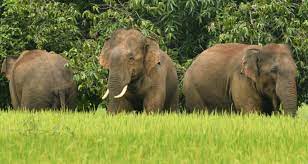India’s first elephant death audit framework introduced by Tamil Nadu

Elephant Death Audit Framework (EDAF): In a first of its kind initiative in India, Tamil Nadu has brought out the ‘Tamil Nadu Elephant Death Audit Framework’ to document reasons for elephant deaths for better accountability. This was released by Chief Minister MK Stalin on Wednesday at the meeting of the State Wildlife Board. Presently, identifying the cause of mortality in the field remains critical for many questions related to population and conservation of elephants. The framework will improve transparency, assist all stakeholders in assessing the results and ultimately facilitate standardisation and more credible comparisons of cause of mortality.
November 2022 Current Affairs Quiz
Elephant death audit framework: Objectives
- The broad objectives of Elephant Death Audit Framework (EDAF), the first-of-its-kind initiative in the country, are threefold, said Supriya Sahu, Additional Chief Secretary, Environment, Climate Change and Forests.
- Only 13 of the 131 elephant deaths noted in Tamil Nadu’s forest divisions between January 1, 2021, and March 15, 2022, were reportedly caused by humans, according to media sources. Out of the rest, 118 were due to natural causes; six because of electrocution; four due to train hits; one due to road accident and two because of retaliatory kills.
Elephant Death Audit Framework: Mortality assessment
- The framework will be helpful to collect mortality assessment data with high quality and credibility through a transparent process. The framework and procedural steps could assist wildlife managers and ecologists to ensure accountability, says the Tamil Nadu Elephant Death Audit Framework document.
- India is home to over two-thirds of the World’s Asian elephant population. Incredibly, they live alongside people across much of India, with only about 20 per cent of their range inside protected areas. Yet their population is stable or even increasing in some regions.
- Wild elephant mortality occurs for several reasons, mostly natural but at times unnatural and preventable. Elephants are among the most long-lived mammals, with a life expectancy of around 50 years in the wild, and a generation length of 22 years. With the rapid anthropogenic change, the context of wild elephants’ lives alongside people is also changing, and their corresponding life expectancy is unknown.